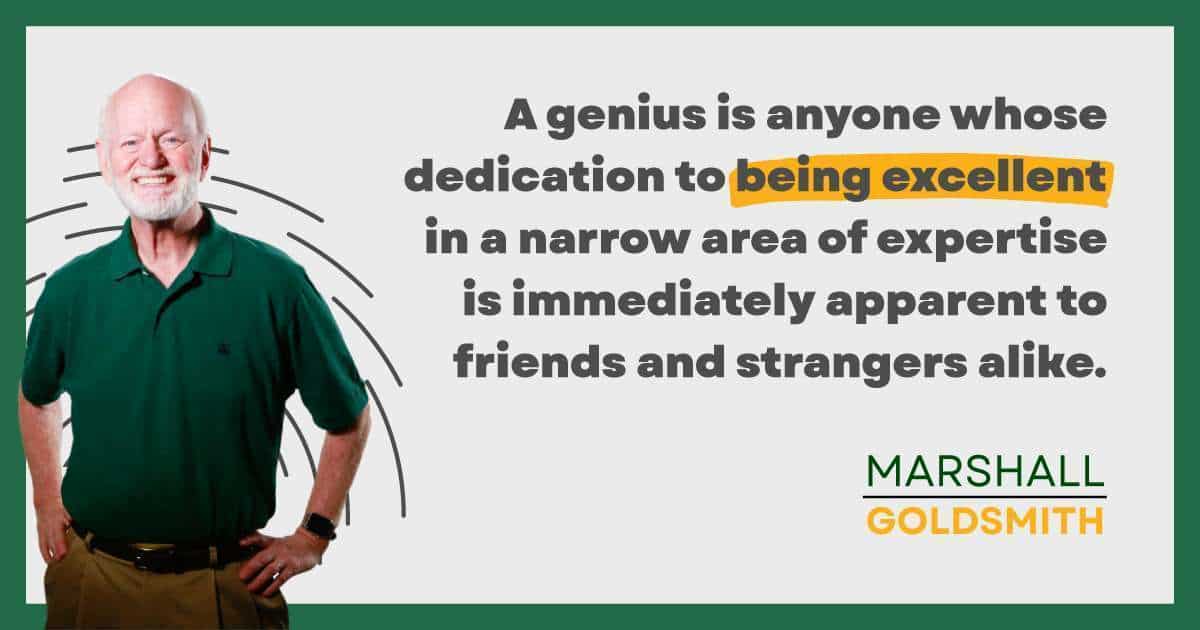Playing Favorites By Marshall Goldsmith There’s a reason I devote...
You don’t have to be a specialist to make a mark in your field. You can be good at one certain thing and still be a generalist of sorts.
People can achieve an earned life on either path. But at some point, as you build your career, you have to commit.
You don’t want to be so-so at a lot of things and good at none.
I’m in favor of specializing. That is the path that I followed in my career, and now I can’t see any other alternative being as good or better.
The bare bones of my career would not predict I’d end up this way. I became a specialist without meaning to, at first. After all, I have a PhD in Behavioral Science. What’s more generalized than the entirety of human behavior?
But everything I’ve done since graduate school has been an exercise in slicing the loaf of my professional interests into ever thinner slivers of specialization.
For one thing, my interest wasn’t in the broad swath of human behavior. It was in organizational behavior, which has a narrower focus: How we behave during our hours in the workplace.
I discovered I didn’t want to work with disengaged and troubled people who were frustrated by their lack of success. I wanted to work with successful people. And not all successful people, just the extremely successful, such as CEOs and other top-tier leaders.
I told would-be clients that if they were looking for help on traditional management issues like strategy, sales, operations, logistics, compensation, and shareholders, I was not their guy. I focused on one thing: the client’s interpersonal behavior. If he or she was doing something that was counterproductive among colleagues at work, I could help him or her change for the better.
This process didn’t happen overnight.
It took years of sampling and stumbling, of absorbing client feedback, of culling my weak spots from my portfolio and keeping what worked.
By my late forties, I had sliced the loaf thin enough that I was not only a specialist in interpersonal behavior in the workplace, I had purposely narrowed my universe of potential customers to an infinitesimal number — just CEOs and people of similar rank.
I might as well have limited my job to being a heart surgeon who only repaired aortic valves in left-handed men in New Hampshire. But the more I stuck to this narrow job description, the better I got at it, until there was a day that I could legitimately say my one trick—helping successful chief executives achieve lasting behavioral change—was now my “genius.”
Not many people were doing this thirty years ago. Not only had I created a unique job suited to my limited interests and skills, but for a while, there, I practically had the field all to myself. I had created a career I could literally call my own.

I didn’t have my career strategy mapped out. I needed time to appreciate that (a) the issues CEOs face are more consequential than those of the average executive and are therefore more engaging, and (b) the fees are better at the top.
When that happens, the world beats a path to your door. That dramatically improves your odds of living a life in which fulfillment overwhelms regret. You’ve created a virtuous circle in which you’re doing what you were meant to do, you’re good at it, people recognize you for it and seek you out, and you’re constantly improving. It’s an enviable position to attain, the essence of an earned achievement. You’ve become what I like to call a “one-trick genius.”
In this sense, a genius is anyone whose dedication to being excellent in a narrow area of expertise is immediately apparent to friends and strangers alike.
For example, I was visiting New York and chipped a tooth before a breakfast meeting. I was in pain throughout the meeting, urgently in need of a dentist. My host, seeing my anguish, insisted that I see his dentist in Rockefeller Center that day—and set up an appointment for me while we were at the table. “He’ll take care of you,” the host assured me. “He’s a genius.”
I’d heard hyperbolic recommendations like this before. Everyone thinks their doctor, nanny, plumber, or massage therapist is the world-class wizard who can solve your problem.
In this case, my host was right. From the moment I stepped into the office, where the receptionist greeted me by name before I said a word, to the hygienist who cleaned my teeth, to the state-of-the-art equipment the dentist used to treat me, and his solicitous manner in making sure he didn’t add to my pain, I knew I was in the hands of a master healer who took pride in his expertise.
If you’ve grown up in a community where Main Street has more than three traffic lights, you know people like that dentist. They’re the local craftsmen and attorneys and teachers and doc- tors and coaches who immediately impress you with their hypercompetence in their chosen field. I regard all of them as one-trick geniuses (or OTG for short).
They’re the kind of people that the Nobel Prize-winning physicist and teacher Richard Feynman had in mind when he advised his students: “Fall in love with some activity, and do it!”
Nearly everything is really interesting if you go into it deeply enough. Work as hard and as much as you want to on the things you like to do the best. Don’t think about what you want to be, but about what you want to do.
And keep up some kind of a minimum with other things, so that society doesn’t stop you from doing anything at all.

Adding Too Much Value Won’t Get You There By Marshall...
C-Suite Master Class: No, But, However By Marshall Goldsmith Continuing...
The Doerr Institute: Expanding the Market for Coaches By Marshall...
Making Leadership Development Part of the College Degree at Rice...
Sanyin Siang – Winner of the Thinkers50 Marshall Goldsmith Coaching...
Thinkers50 Marshall Goldsmith Distinguished Achievement Award in Coaching – Nominees...
Leading with Influence: What Is Influence360°? By Marshall Goldsmith Founder...
Are You a Dominator, Manipulator, Persuader or Influencer? By Marshall...
Leading with Influence: Redefining Modern Influence Part 2 By Marshall...
My mission is simple. I want to help successful people achieve positive, lasting change and behavior; for themselves, their people, and their teams. I want to help you make your life a little better. With four decades of experience helping top CEOs and executives overcome limiting beliefs and behaviors to achieve greater success, I don’t do this for fame and accolades. I do this because I love helping people!
As an executive educator and coach, I help people understand how our beliefs and the environments we operate in can trigger negative behaviors. Through simple and practical advice, I help people achieve and sustain positive behavioral change.